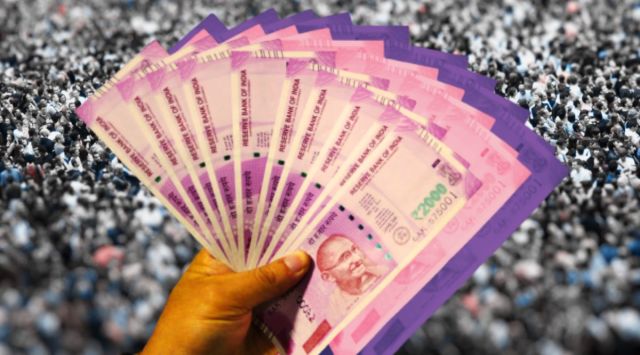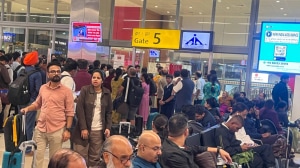Banks follow different rules, people use various avenues to dump notes
Most private banks asked non-account holders to provide proofs. SBI had clarified in an official note to its branches that no form or slip would be required while exchanging or depositing Rs 2,000 notes.
 Though there were no chaotic scenes at branches of banks across the country, customers complained that banks were asking for identity proofs and requisition forms.
Though there were no chaotic scenes at branches of banks across the country, customers complained that banks were asking for identity proofs and requisition forms. Confusion marked day one of exchange of Rs 2,000 notes, whose withdrawal was announced by the Reserve Bank of India (RBI) on May 19. People seemed to want to get rid of the notes by any means, while different banks adopted different standards for exchange of notes. People also resorted to various avenues, such as e-commerce deals, fuel stations, super markets, and gold purchases to use the notes.
Though there were no chaotic scenes at branches of banks across the country, customers complained that banks were asking for identity proofs and requisition forms.
While public sector banks, led by State Bank of India (SBI) exchanged notes without any proofs or forms, private banks including HDFC Bank, ICICI Bank are asking customers to fill the forms from everyone and sought identity proofs from non-account holders.
Most private banks asked non-account holders to provide proofs. SBI had clarified in an official note to its branches that no form or slip would be required while exchanging or depositing Rs 2,000 notes.
While HDFC Bank and ICICI Bank did not respond to queries sent to them, a senior official with a private sector bank said, “If you are my customer, I have your KYC (know your customer) details and so there is no issue. But if you are not my customer, then you will have to provide identity proof for exchanging the notes as we have to maintain the statistics.”
A senior official with another bank said, “There is no clarity from the Reserve Bank on the guidelines. We are collecting details as a prudent measure because we don’t know when the policy will change and we will be required to submit the data.”
Meanwhile, responding to customer query on the social media platform Twitter where the customer asked as to “why is @HDFCBank_Cares @HDFC_Bank giving out forms and taking id proof to exchanging it and creating chaos????,” HDFC Bank Cares service manager wrote, “As part of the due diligence process of the bank, we request you to fill the requisition slip along with the self-attested copy of ID proof for getting notes exchanged.”
On the other hand, public sector banks including SBI, Punjab National Bank and Bank of Baroda are not asking for any identity proof or filling of form. Bank of Baroda in a statement said, “In line with RBI guidelines, Bank of Baroda issued SOP and guidelines to all operating units in connection with deposit and exchange of Rs 2,000 notes over the counter.
As per the same, Bank of Baroda is not asking for any form to be filled up or a copy of identity proof from the tenderer for exchanging Rs 2000 banknotes from the general public.”
Many branches in metros and towns across the country witnessed hordes of people lining up for exchange notes. According to banking procedures, if a customer wants to deposit cash, he/ she will have to fill up the requisition form in normal cases.
Apart from note exchange, people also used various avenues like e-commerce, super markets and petrol stations to get rid of their Rs 2,000 notes. Small shops refused to accept Rs 2,000 notes saying there’s shortage of change. Various shops across the country put up notices saying ‘no’ to Rs 2,000 notes.
The exchange of Rs 2,000 notes into notes of other denominations can be made up to a limit of Rs 20,000 at a time at any bank. A person can go to different branches can exchange notes but he will still end up holding cash and deposit above Rs 50,000 in a day can invite scrutiny by government agencies.
E-commerce and super markets: Reports suggest that people have been using Rs 2,000 notes for big purchases of even consumer durables like air conditioners. Food app Zomato said 72 per cent of cash on delivery were through Rs 2,000 notes. Cash boxes of gas stations are filled with Rs 2,000 notes. However, small shops which are refusing to accept Rs 2,000 notes are asking customers to pay by UPI apps or cash in smaller denominations.
Gold: Gold jewellery shops in Mumbai and other metros witnessed a spurt in gold purchases with Rs 2,000 notes. “The number of customers using Rs 2,000 notes to purchase gold jewellery rose sharply in the last two days. This trend is expected to continue in the next a few weeks. Gold can be later pledged by a customer and raise 90 per cent of the value of the gold as loan to make it legal,” said a bullion market source.
Hotels: Hotel industry insiders said customers who mostly used to pay by debit or credit cards in upmarket restaurants are now using the Rs 2,000 notes. Hotel industry expects this trend to continue till September 30. The RBI has made it clear that these notes will remain a legal tender at least till September 30.
Fuel stations: Cash payments at fuel stations have surged as more and more people are using the notes to buy petrol and diesel across the country. As a result, many fuel stations have reported a shortage of smaller denomination notes.
According to the All-India Petroleum Dealers Association, from just 10 per cent before the RBI’s Friday announcement, the share of Rs 2,000 notes in cash transactions at fuel bunks has shot up to 90 per cent. Digital payments, which the association said had made up 40 per cent of fuel pumps’ total sales, have contracted to just 10 per cent.
Meanwhile, experts claimed that the withdrawal of Rs 2,000 notes is a non-event. “Even though the impact of Rs 2,000 note withdrawal is a non-event, there will be a favourable impact on liquidity, bank deposits and interest rates. Decoding exchange/ deposit dynamics, we understand, banks will already be holding some of these notes in their currency chests, thus the impact on deposits will be limited. We believe that the almost the entire amount of Rs 3.6 lakh crore will come back (Rs 3 lakh crore excluding the amount in currency chests) to the banking system),” said Soumya Kanti Ghosh, Group Chief Economic Adviser, SBI.
- 01
- 02
- 03
- 04
- 05































